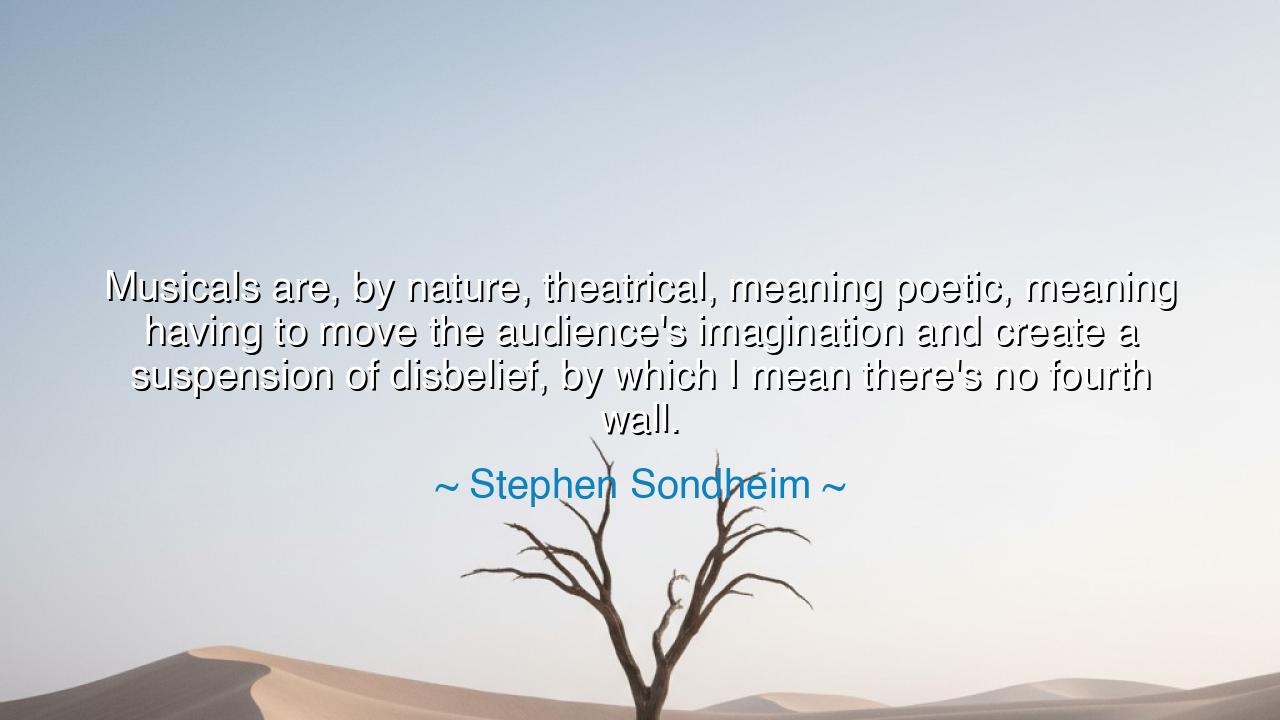
Musicals are, by nature, theatrical, meaning poetic, meaning
Musicals are, by nature, theatrical, meaning poetic, meaning having to move the audience's imagination and create a suspension of disbelief, by which I mean there's no fourth wall.






The Song Beyond the Wall: The Poetic Nature of Theater
Hear the words of Stephen Sondheim, master of song and architect of emotion, who once said: “Musicals are, by nature, theatrical, meaning poetic, meaning having to move the audience's imagination and create a suspension of disbelief, by which I mean there's no fourth wall.” In this declaration lies a wisdom older than the stage itself, for he speaks not merely of performance, but of the ancient bond between the storyteller and the soul of the listener. What is theater, if not a sacred space where imagination breathes and the heart learns to dream again?
When Sondheim speaks of musicals as “by nature, theatrical,” he calls us back to the origins of art itself — to the time when song and speech were one, when the poet was also the prophet. In those early days, before curtains and scripts, men and women gathered around the fire, and through rhythm, word, and melody, they entered the realm of the unseen. This is what Sondheim means by poetic — not merely the rhyming of syllables, but the power to move the imagination, to awaken the spirit to something beyond the literal. Theater, like poetry, is a vessel for what cannot be said plainly: truth disguised in beauty, wisdom wrapped in melody.
Consider how he speaks of suspension of disbelief. This phrase is no small thing — it is the foundation upon which all art rests. When the audience surrenders their logic and enters the dream, they become participants in creation. The walls between performer and observer dissolve; there is no fourth wall. The singer does not perform for the audience but with them — both are bound in the same spell. Thus, in the musical, we find a sacred union: the stage becomes a mirror, and the mirror becomes a world. The performer, through song, does not simply tell us who they are — they remind us who we are.
In this, Sondheim reveals the divine paradox of theater: that what is most artificial may reveal what is most true. A man bursting into song on stage defies reason — yet in that moment, emotion becomes pure. Reality itself steps aside, and what remains is the truth of the heart. So it was in the tragedies of Sophocles, when gods walked among mortals and men sang their suffering aloud. So it is in Sondheim’s own works — when Sweeney Todd wields his blade, or when Maria and Tony sing of love amid death. We believe it, not because it is real, but because it is true.
Let us remember also that the absence of the fourth wall is not mere technique — it is philosophy. To break the wall is to admit that art and life are one. The stage is not a prison of illusion; it is a window into the human soul. When actors gaze into the eyes of their audience, they awaken what lies sleeping there — empathy, longing, memory. The old Greeks called this catharsis, the cleansing of the heart through shared emotion. Thus, every song, every dance, every soliloquy becomes a bridge across the chasm of loneliness.
One might recall the story of h Piaf, singing on the darkened stages of Paris after the war. Her voice carried sorrow and triumph in equal measure. When she sang, the crowd forgot they were an audience — they were one beating heart. She lived Sondheim’s truth: there was no wall between her and the people. The music, the poetry, the performance — all were one act of communion. Such is the power of art that dares to be human.
So, my listener, learn from this teaching: to create, you must not hide behind walls. Let your words, your actions, your passions reach beyond the veil of fear and self. Whether you stand on a stage or walk through life, live poetically. Speak with feeling, act with honesty, and let your imagination move those around you. For the greatest art — and the greatest life — is one in which no wall divides the self from the world. In every breath, in every song, may your truth reach others, and may you, like Sondheim, remind them that imagination itself is divine.






AAdministratorAdministrator
Welcome, honored guests. Please leave a comment, we will respond soon